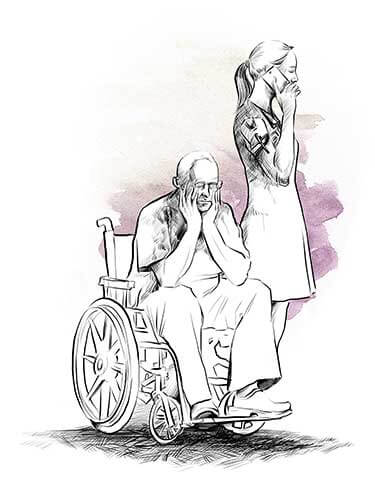Elderly people are one of the most vulnerable groups in the nation… Are You Thinking of Suing a Nursing Home for Negligence in Georgia?

Being vulnerable is especially true when an elderly person suffers from a health condition that prevents them from performing self-care.
As such, nursing homes throughout the country establish to provide elderly, disabled, or ill patients with the care, safety, companionship, and security they need to live the highest quality life possible.
Nursing homes owe a high duty of care to nursing home residents, and most of us expect this standard will be met.
Which is why nursing home negligence and abuse can be so shocking and horrific; we expect nursing home staff to care for our loved ones, not cause them harm.
If you believe your loved one is a victim of nursing home negligence, you may be able to file a lawsuit for damages.
Here’s a look into what you need to know about lawsuits against nursing homes and how to bring forth a successful claim. For a free consultation with our Georgia nursing home abuse attorneys, please call (706) 354-4000 or fill out the online form below.
Get a Free Nursing Home Negligence Case Review
Do you have questions about suing a nursing home for negligence in Georgia? Simply submit the short form below to speak with an experienced nursing home negligence and abuse attorney from BBGA about your case.
SUING A NURSING HOME FOR NEGLIGENCE
Examples of Negligence that Can Lead to Patient Harm
A civil lawsuit surrounding nursing home negligence alleges that a nursing home acted negligently (i.e. breached the duty of care owed to a patient), and that the negligence was the direct cause of the patient’s harm.
Examples of nursing home negligence that can lead to harm include:
Negligent Hiring
Nursing homes need not only maintain a satisfactory staff-to-patient ratio but are also tasked with ensuring that those they hire can pass a background check, hold any necessary certifications or training prerequisites, and are overall eligible and qualified for the job.
Failure to Maintain a Safe Premise
A nursing home can be a dangerous place for a resident, especially one who has trouble navigating on their own. Failure to maintain a safe premise can increase the risk of injury. This includes the failure to ensure physical hazards (such as walking hazards) are remedied, as well as health-, safety-, and sanitation-related hazards.
Negligent Supervision
When nursing home residents are not receiving proper supervision, especially those that require around-the-clock care, accidents may result. Examples of accidents include bed strangulation accidents, choking accidents, slip and fall accidents, and resident-on-resident assaults.
Failure to Provide Satisfactory Medical Treatment
Finally, nursing homes have a duty to provide residents with adequate medical treatment and care, and when they fail to do so, residents can suffer. Medication errors, treatment errors, and other types of substandard care may warrant a nursing home negligence suit.
Is it difficult to sue a nursing home?
Suing a nursing home can be challenging due to the complexities of the legal system. It’s advisable to seek assistance from experienced attorneys who can file a lawsuit, gather evidence, and pursue compensation. Without proper legal representation, navigating the complexities of suing a nursing home can be overwhelming and significantly challenging.
The Elements of a Successful Claim Against a Nursing Home
In order to win a claim against a nursing home, a plaintiff will need to provide evidence that establishes a few primary elements.
These elements include:
Negligence/Breach of the Duty of Care
One of the most important things to prove is that the nursing home breached the duty of care owed to a nursing home resident, via one of the negligent actions listed above (or another act of negligence not listed). In some cases, you may be able to show that a statutory breach, or negligence per se, occurred. For example, if a nursing home failed to meet minimum licensing standards, it has committed negligence per se. Negligence per se is when an act receives negligent consideration because it violates a statute.
Direct Causation
You must also prove that the nursing home’s negligence was the direct cause of the nursing home resident’s harm and that harm would not have occurred but for the negligent action. For example, if a nursing home resident would not have suffered a slip and fall but for a hazardous area of the property that was unattended to, then causation has been demonstrated.
Damages
Finally, suing a nursing home for negligence will only yield compensation in the event that you can prove that damages were actually suffered by the victim.
Steps to Take If You Think You Have a Claim
Suing a nursing home for negligence is a hard case to win; it’s not always obvious how an injury occurred, or who should be held liable for harm.
If you think nursing home neglect or abuse is occurring, or if you believe that your loved one was harmed as a result of nursing home negligence, you should act quickly to preserve your right to damages.
This includes:
- Documenting all signs of neglect,
- Recording the details of the event that led to injury,
- Reporting any accident/injuries to the nursing home,
- Reporting the nursing home to the Georgia Department of Community Health – Healthcare Facility Regulation, and
- Calling a skilled nursing home neglect lawyer immediately.
Seek Legal Assistance for Nursing Home Neglect
Suing a nursing home for negligence requires the help of a legal professional.
At Blasingame, Burch, Garrard and Ashley, P.C., our Georgia nursing home abuse lawyers are ready to work on your case.
Reach out to us online or call (706) 354-4000 today for your free consultation.
We have offices in Atlanta, Athens, and Lake Oconee and take cases across the state of Georgia. We offer free consultations and there is no fee unless we win your case.


